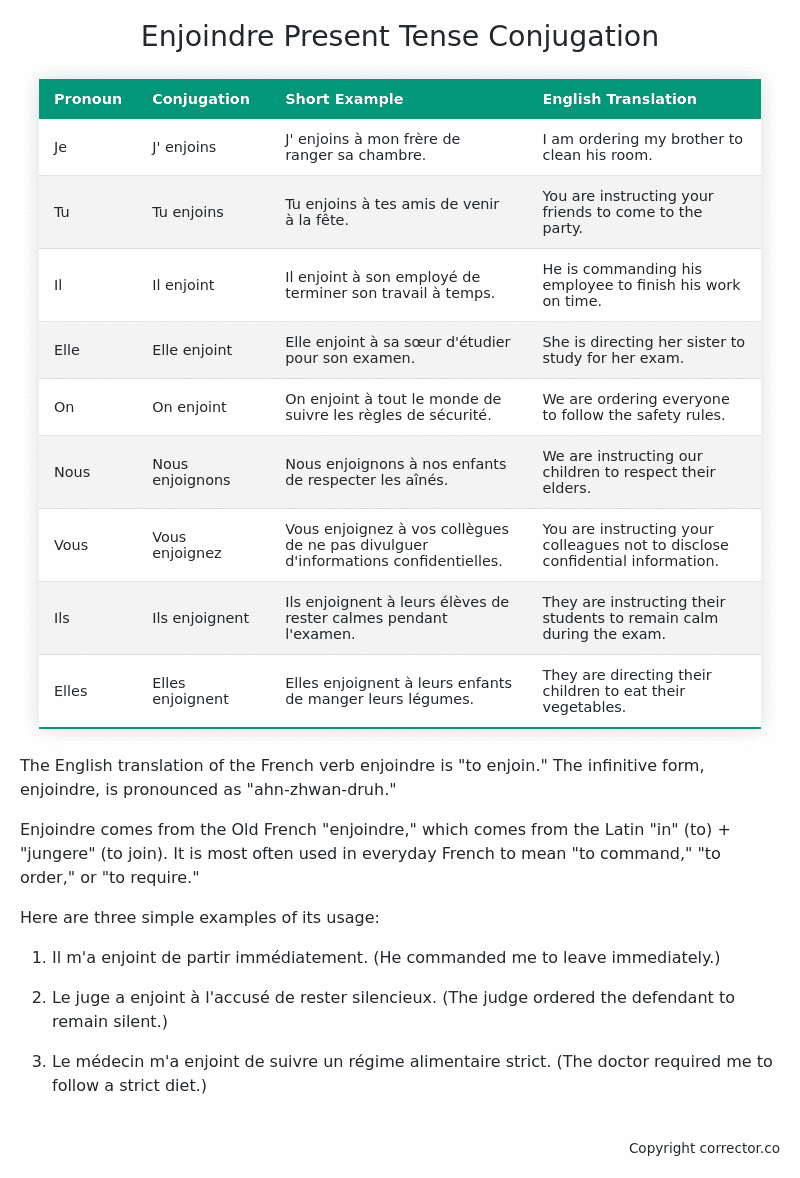Le Present (Present Tense) Conjugation of the French Verb enjoindre
Introduction to the verb enjoindre
The English translation of the French verb enjoindre is “to enjoin.” The infinitive form, enjoindre, is pronounced as “ahn-zhwan-druh.”
Enjoindre comes from the Old French “enjoindre,” which comes from the Latin “in” (to) + “jungere” (to join). It is most often used in everyday French to mean “to command,” “to order,” or “to require.”
Here are three simple examples of its usage:
-
Il m’a enjoint de partir immédiatement. (He commanded me to leave immediately.)
-
Le juge a enjoint à l’accusé de rester silencieux. (The judge ordered the defendant to remain silent.)
-
Le médecin m’a enjoint de suivre un régime alimentaire strict. (The doctor required me to follow a strict diet.)
Enjoindre – About the French Present Tense
To take a deep dive into all the French tenses then see our article on Mastering French Tense Conjugation.
Common Everyday Usage Patterns For Le Present
Interactions with Other Tenses
Table of the Present Tense Conjugation of enjoindre
| Pronoun | Conjugation | Short Example | English Translation |
|---|---|---|---|
| Je | J’ enjoins | J’ enjoins à mon frère de ranger sa chambre. | I am ordering my brother to clean his room. |
| Tu | Tu enjoins | Tu enjoins à tes amis de venir à la fête. | You are instructing your friends to come to the party. |
| Il | Il enjoint | Il enjoint à son employé de terminer son travail à temps. | He is commanding his employee to finish his work on time. |
| Elle | Elle enjoint | Elle enjoint à sa sœur d’étudier pour son examen. | She is directing her sister to study for her exam. |
| On | On enjoint | On enjoint à tout le monde de suivre les règles de sécurité. | We are ordering everyone to follow the safety rules. |
| Nous | Nous enjoignons | Nous enjoignons à nos enfants de respecter les aînés. | We are instructing our children to respect their elders. |
| Vous | Vous enjoignez | Vous enjoignez à vos collègues de ne pas divulguer d’informations confidentielles. | You are instructing your colleagues not to disclose confidential information. |
| Ils | Ils enjoignent | Ils enjoignent à leurs élèves de rester calmes pendant l’examen. | They are instructing their students to remain calm during the exam. |
| Elles | Elles enjoignent | Elles enjoignent à leurs enfants de manger leurs légumes. | They are directing their children to eat their vegetables. |
Other Conjugations for Enjoindre.
Le Present (Present Tense) Conjugation of the French Verb enjoindre (this article)
Imparfait (Imperfect) Tense Conjugation of the French Verb enjoindre
Passé Simple (Simple Past) Tense Conjugation of the French Verb enjoindre
Passé Composé (Present Perfect) Tense Conjugation of the French Verb enjoindre
Futur Simple (Simple Future) Tense Conjugation of the French Verb enjoindre
Futur Proche (Near Future) Tense Conjugation of the French Verb enjoindre
Plus-que-parfait (Pluperfect) Tense Conjugation of the French Verb enjoindre
Passé Antérieur (Past Anterior) Tense Conjugation of the French Verb enjoindre
Futur Antérieur (Future Anterior) Tense Conjugation of the French Verb enjoindre
Subjonctif Présent (Subjunctive Present) Tense Conjugation of the French Verb enjoindre
Subjonctif Passé (Subjunctive Past) Tense Conjugation of the French Verb enjoindre
Subjonctif Imparfait (Subjunctive Imperfect) Tense Conjugation of the French Verb enjoindre
Subjonctif Plus-que-parfait (Subjunctive Pluperfect) Tense Conjugation of the French Verb enjoindre
Conditionnel Présent (Conditional Present) Tense Conjugation of the French Verb enjoindre
Conditionnel Passé (Conditional Past) Tense Conjugation of the French Verb enjoindre
L’impératif Présent (Imperative Present) Tense Conjugation of the French Verb enjoindre
L’infinitif Présent (Infinitive Present) Tense Conjugation of the French Verb enjoindre
Struggling with French verbs or the language in general? Why not use our free French Grammar Checker – no registration required!
Get a FREE Download Study Sheet of this Conjugation 🔥
Simply right click the image below, click “save image” and get your free reference for the enjoindre Present Tense tense conjugation!

I hope you enjoyed this article on the verb enjoindre. Still in a learning mood? Check out another TOTALLY random French verb present conjugation!


